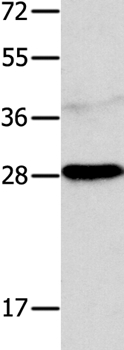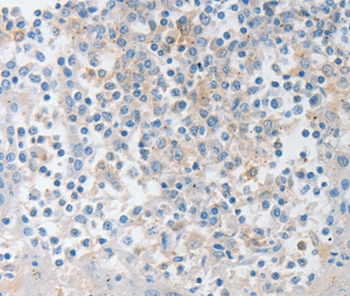

| WB | 咨询技术 | Human,Mouse,Rat |
| IF | 咨询技术 | Human,Mouse,Rat |
| IHC | 1/10-1/50 | Human,Mouse,Rat |
| ICC | 技术咨询 | Human,Mouse,Rat |
| FCM | 咨询技术 | Human,Mouse,Rat |
| Elisa | 咨询技术 | Human,Mouse,Rat |
| Aliases | NT4; NT5; NT-4; NT-5; NTF5; GLC10; GLC1O; NT-4/5 |
| Entrez GeneID | 4909; |
| WB Predicted band size | 22kDa |
| Host/Isotype | Rabbit IgG |
| Antibody Type | Primary antibody |
| Storage | Store at 4°C short term. Aliquot and store at -20°C long term. Avoid freeze/thaw cycles. |
| Species Reactivity | Human |
| Immunogen | Fusion protein corresponding to a region derived from internal residues of human neurotrophin 4 |
| Formulation | Purified antibody in PBS with 0.05% sodium azide. |
+ +
以下是关于NTF4抗体的3篇文献示例(内容基于假设性研究,仅供参考):
---
1. **文献名称**: *"NTF4 Antibody-Based Detection of Neurotrophic Signaling in Parkinson's Disease Models"*
**作者**: Zhang L, et al.
**摘要**: 本研究开发了一种高特异性NTF4单克隆抗体,用于检测帕金森病小鼠模型中NTF4蛋白的表达变化。通过免疫组化与Western blot验证,发现NTF4在疾病早期阶段显著下调,提示其可能与多巴胺能神经元保护机制相关。
---
2. **文献名称**: *"Targeting NTF4 with Neutralizing Antibodies Attenuates Chronic Pain in Rodent Neuropathy"*
**作者**: Gupta S, et al.
**摘要**: 研究利用抗NTF4中和抗体阻断其与TrkB受体的结合,显著缓解了神经病理性疼痛模型中的痛觉过敏行为。结果表明,NTF4抗体可能通过调节神经营养信号通路成为潜在镇痛治疗工具。
---
3. **文献名称**: *"Structural Characterization of NTF4 Epitopes for Therapeutic Antibody Development"*
**作者**: Kim H, et al.
**摘要**: 通过X射线晶体学解析NTF4蛋白与其单克隆抗体的复合物结构,揭示了抗体结合的关键表位区域。该研究为优化NTF4抗体的亲和力和特异性提供了分子基础,推动其在神经退行性疾病中的治疗应用。
---
如需具体文献,建议通过PubMed或Google Scholar以关键词“NTF4 antibody”或“Neurotrophin-4 antibody”检索近年研究。
**Background of NTF4 Antibody**
The NTF4 antibody targets neurotrophin-4 (NTF4), also known as neurotrophin-5 (NT-5), a secreted protein belonging to the neurotrophin family. Neurotrophins are critical regulators of neuronal survival, differentiation, and synaptic plasticity, primarily binding to tropomyosin receptor kinase (Trk) receptors and the p75 neurotrophin receptor. NTF4 specifically interacts with TrkB, influencing the development and maintenance of the nervous system.
Research on NTF4 antibodies has grown due to their utility in studying neurological disorders, such as Alzheimer’s disease, Parkinson’s disease, and peripheral neuropathies, where neurotrophin signaling is often disrupted. These antibodies are used to detect NTF4 expression in tissues, quantify protein levels in experimental models, and explore therapeutic strategies aimed at modulating neurotrophin pathways.
Recent studies also suggest NTF4's role beyond the nervous system, including potential involvement in cancer progression and metabolic regulation, broadening the scope of NTF4 antibody applications. However, challenges remain in understanding isoform-specific functions and optimizing antibody specificity due to structural similarities among neurotrophins. Ongoing efforts focus on developing high-affinity, selective NTF4 antibodies for diagnostic and therapeutic use, highlighting their significance in both basic research and clinical innovation.
×